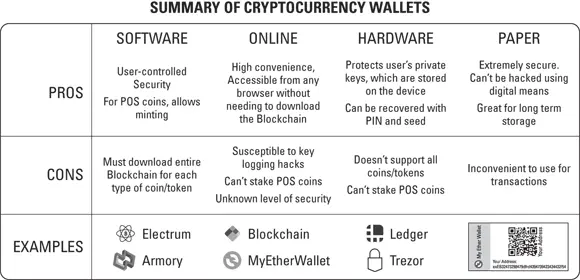
© John Wiley & Sons, Inc.
FIGURE 3-1:Popular cryptocurrency wallet types.
Online wallets may be less secure, but they do have a bunch of advantages for small amounts of cryptocurrencies. An online (or web ) wallet allows you access to your cryptos via the Internet. Therefore, as long as you’re connected to the Internet (the cloud), you can reach and store your coins and make crypto payments. The online wallet provider stores your wallet’s private key on its server. The provider may send you the crypto code but store your keys and give you the ability to access your keys. Different services offer various features, with some of them linking to multiple devices such as your mobile phone, tablet, and computer.
Advantages of online wallets include the following:
They enable fast transactions.
They may be able to manage multiple cryptocurrencies.
They’re convenient for use on the go and for active trading.
Disadvantages include the following:
They risk your online security because of potential vulnerability to hacks and scams.
They risk your personal security because of potential exposure to computer viruses.
You aren’t storing your cryptos; a third party is.
Table 3-1shows some popular online wallets.
TABLE 3-1Popular Web Wallets
| Name |
Description |
Pros |
Cons |
MyEtherWallet, www.myetherwallet.com |
Open-source, decentralized cold wallet. You locally control your keys. |
Most popular Ethereum web wallet. Works well with hardware wallets. |
Has been hacked and may be vulnerable to phishing attacks. |
Coinbase, www.coinbase.com |
Popular cryptocurrency exchange that also provides a hot wallet. |
Provides more than just wallet services. Long history handling cryptocurrency. |
Limited tokens and coins supported. Keys stored online. |
Guarda, https://guarda.co |
Cold wallet that supports multiple cryptocurrencies and makes it easy to transfer funds between cryptocurrencies. Also offers a desktop wallet. |
One of the first to support multiple types of coins and tokens. Doesn't store personal information. |
User must manage local key storage. |
Mobile wallets are available on your cellphone through an app. You can use mobile wallets when shopping in physical stores as cryptocurrencies become more acceptable. Note: Other types of wallets, such as online wallets (see the preceding section), offer mobile versions as well. But some wallets are specifically and only used for mobile phones.
Mobile wallets (see Table 3-2for some popular ones) fall into the category of software wallets and have these advantages:
They can be safer than online wallets.
They’re convenient for use on the go.
They offer additional features such as QR code scanning.
Some disadvantages of mobile wallets include the following:
You risk losing your crypto assets if your phone is lost or damaged.
They run the risk of getting mobile viruses and malware.
TABLE 3-2Popular Mobile Wallets
| Name |
Description |
Pros |
Cons |
Jaxx, https://jaxx.io/ |
Cold wallet available on mobile devices and desktops (Windows, macOS, Linux). |
Multi-platform support. Stores keys on specified device. |
Code is not open source. Limited number of coins and tokens supported. |
Coinomi, www.coinomi.com |
Cold wallet for multiple cryptocurrencies that runs on iOS and Android mobile devices. |
Runs on Android, iOS, and desktops. Extensive list of supported coins and tokens. Focus on privacy. |
Code is not open source. |
Bread (BRD), https://brd.com/ |
Cold wallet for multiple cryptocurrencies that runs on iOS and Android mobile devices. |
No central server. Easy to use and fast. Code is open source. |
Limited number of supported coins and tokens. No two-factor authentication. |
You can download a desktop wallet and install it on your computer. Some argue that desktop wallets are safer if your computer isn’t (or even better, has never been) connected to the Internet. If a desktop computer has never been connected to the Internet, it essentially becomes a cold wallet. On the other hand, a computer that has never been connected to the Internet may expose you to malware that may automatically move from the wallet drive that you connect to the computer and infect the desktop because it’s never been patched with software updates that require an Internet connection. Talk about a catch-22!
 To set up your wallet on a computer that has never been connected to the Internet, you must first download the latest version of the wallet on a computer that is connected to the Internet. You then move the file to a USB drive or something similar in order to move it to your offline computer.
To set up your wallet on a computer that has never been connected to the Internet, you must first download the latest version of the wallet on a computer that is connected to the Internet. You then move the file to a USB drive or something similar in order to move it to your offline computer.
See Table 3-3for examples of popular desktop wallets. Some advantages of desktop wallets (which fall into the category of software wallets) include the following:
They’re a convenient choice if you trade cryptos from your computer.
You aren’t storing your private keys on a third-party server.
If your computer has never been connected to the Internet, a desktop wallet can be safer than an online wallet.
TABLE 3-3Popular Desktop Wallets
| Name |
Description |
Pros |
Cons |
Exodus, www.exodus.io |
First to offer multiple cryptocurrencies in a single wallet. Cold wallet with easy key backup-and-restore operations. |
Visually appealing and informative, easy-to-use interface. |
Source code is not open source. |
Mist, https://sourceforge.net/projects/ethereum-wallet.mirror |
Cold wallet and the official Ethereum wallet, developed by those who created Ethereum. |
Created by the Ethereum Foundation, and an officially endorsed wallet. |
Less user-friendly than other wallets. |
MetaMask, https://metamask.io/ |
Cold wallet running as a Firefox or Chrome extension. Supports easy switching between test and live Ethereum networks. |
Partially funded by the Ethereum Foundation, easy to use in Chrome. Easy to switch between test and live networks. |
Released only as a Chrome extension, making it possible for other websites to see that you have a wallet installed. |
But desktop wallets do come with some disadvantages:
Using your crypto assets on the go is more difficult.
If you connected the wallet to the Internet, it turns into a less secure hot wallet.
If you don’t back up your computer and it dies, you lose your cryptos.
A hardware wallet can arguably be one of the safest types of crypto wallets out there. These wallets store your private keys on a device like a USB drive. You’re still able to make online transactions, but the wallets are offline most of the time, so you can consider them cold wallets. Check out Table 3-4for a short list of popular hardware e-wallets.
Читать дальше


 To set up your wallet on a computer that has never been connected to the Internet, you must first download the latest version of the wallet on a computer that is connected to the Internet. You then move the file to a USB drive or something similar in order to move it to your offline computer.
To set up your wallet on a computer that has never been connected to the Internet, you must first download the latest version of the wallet on a computer that is connected to the Internet. You then move the file to a USB drive or something similar in order to move it to your offline computer.










